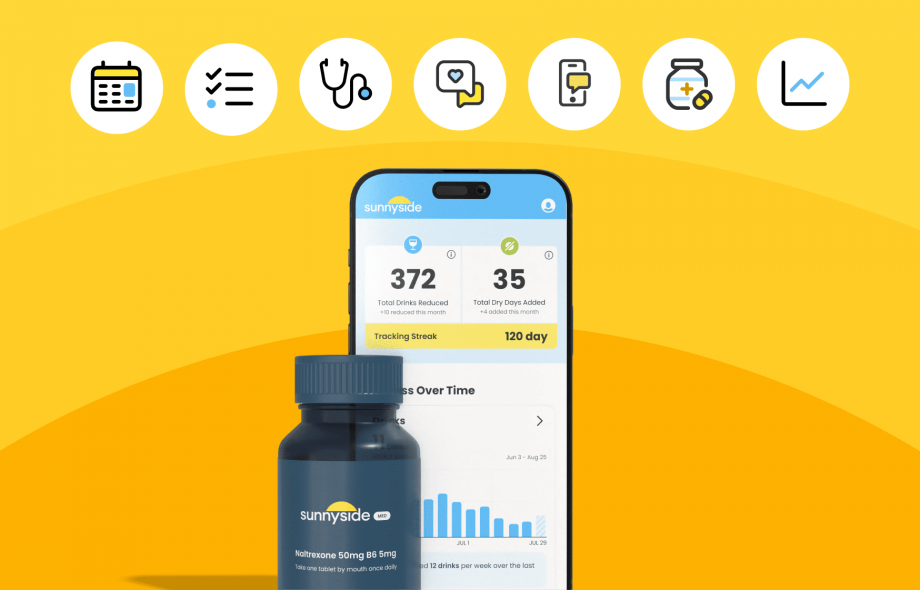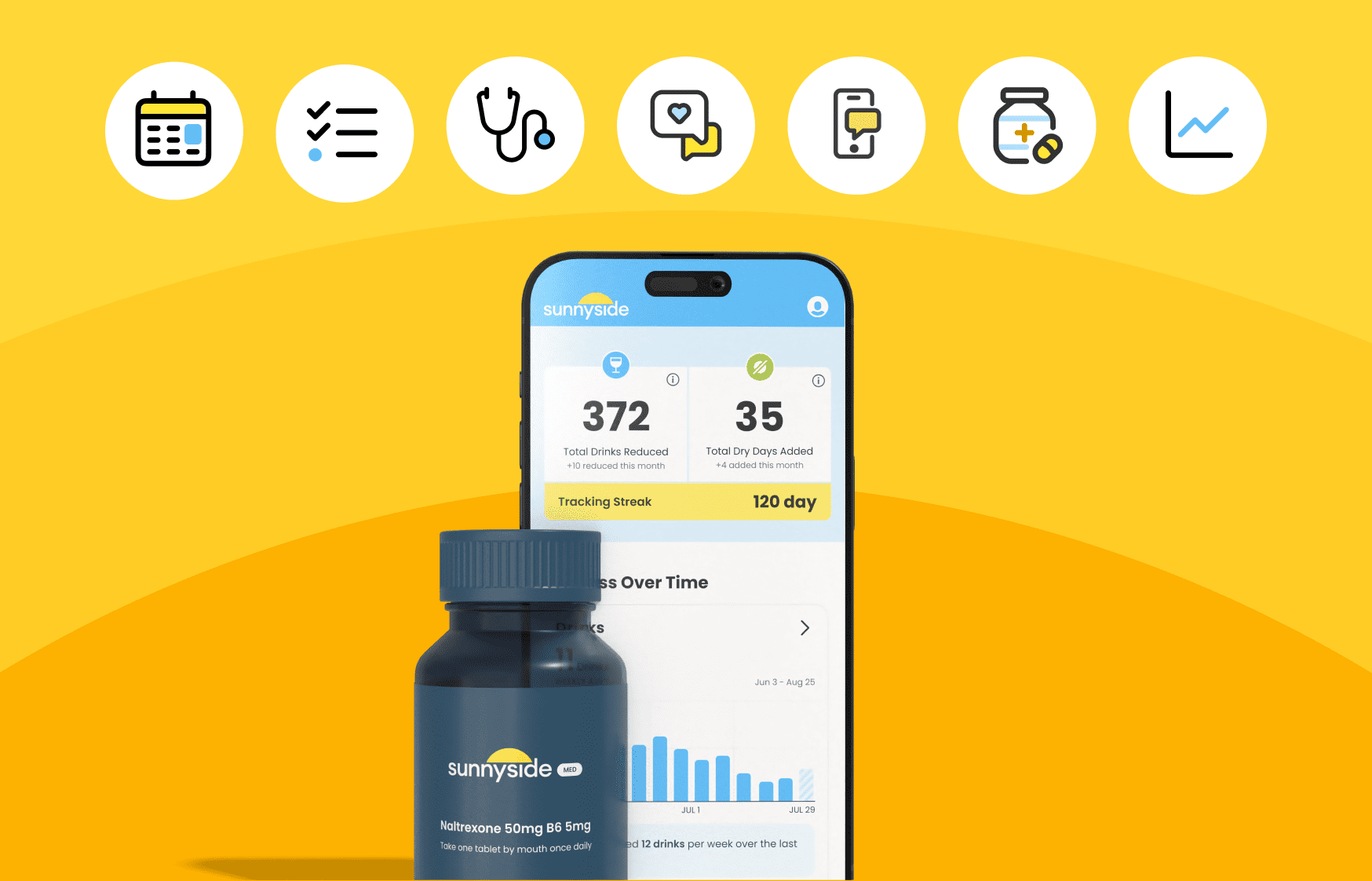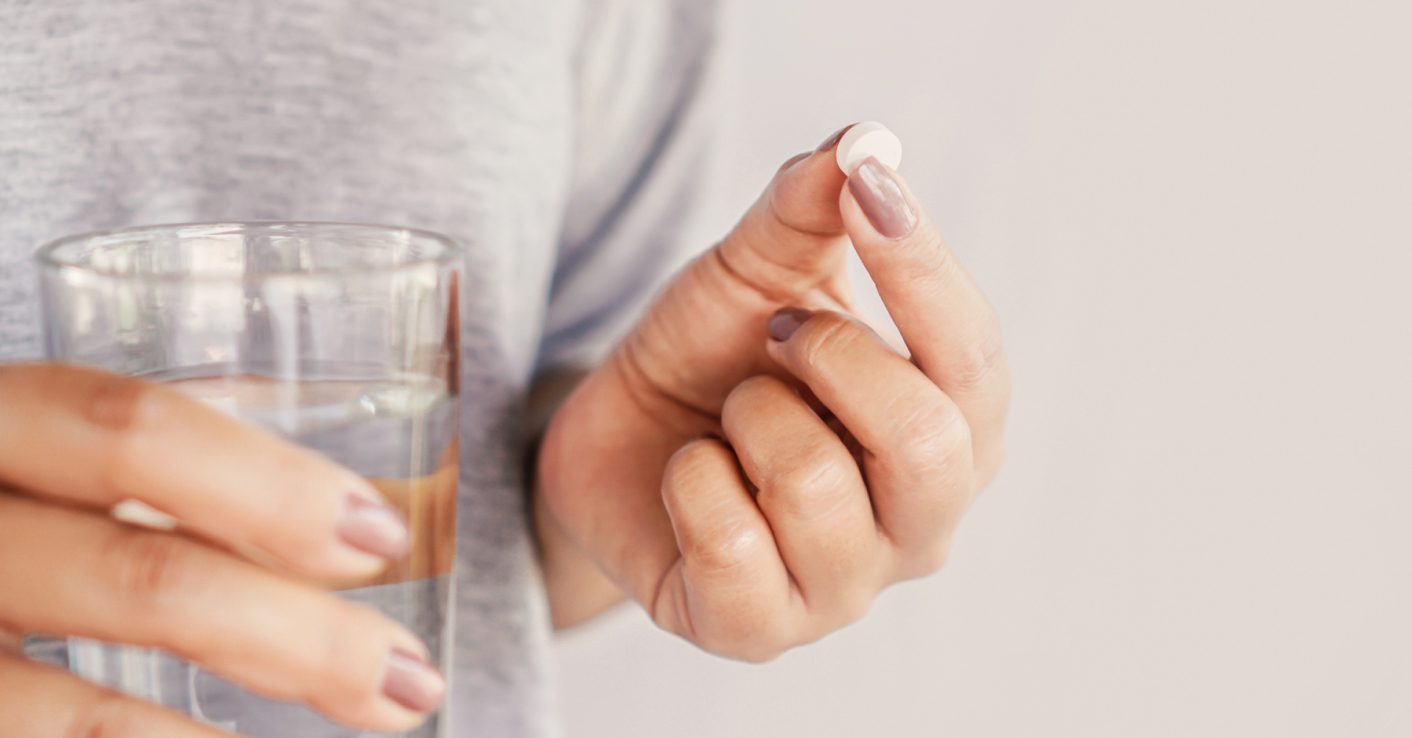Last Updated on September 30, 2025

Announcing the public launch of Sunnyside Med, pairing medication for alcohol reduction with our proven companion program for long-term behavior change. We’re building an entirely new approach to alcohol health with a focus on proactive, preventive care, providing a much-needed alternative to the rigid, reactive care model that dominates today.
At Sunnyside, our mission from day one has been to change the way the world drinks alcohol, helping millions on the path to healthier, happier lives.
This mission is deeply personal for me, stemming from my lived experiences growing up in a household with two parents whose habits spiraled until they found their way into recovery, and then struggling with alcohol overuse myself for many years. When my co-founder Ian was 11, he lost his mother due to liver failure from alcohol, and his father struggled with drinking as well before eventually finding sobriety with the help of AA. Alcohol shaped our lives from an early age. And we know our stories are far from unique.
The current system for addressing alcohol overuse is reactive and one-size-fits all, leaving many millions behind. We built Sunnyside around the belief that there’s a better way.
Since our founding 5 years ago, our app-based alcohol habit change program has helped more than half a million people on the path to healthier drinking habits. The effectiveness of our approach has been validated by peer reviewed research, not to mention countless firsthand success stories. While we’re incredibly proud of this impact, we know there’s much more work to be done.
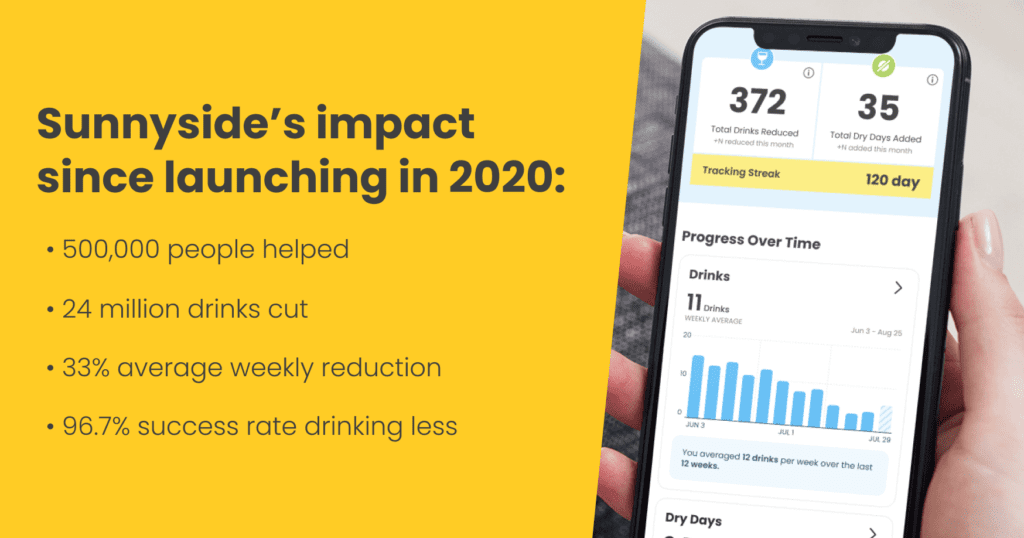
In the last 5 years, the health landscape has fundamentally shifted. Focus on healthspan and longevity have emerged as key health priorities. We’re taking our proactive, preventive health into our own hands like never before. And the explosion of GLP-1 medications for weight loss has revolutionized how we think about behavioral health, shifting the narrative from willpower and personal failing to a more nuanced understanding of the problem. We’re learning to focus on outcomes, with empathy for the powerful biochemical and neurological forces at play.
At Sunnyside, it’s clear to us that the behavioral health revolution that’s started with weight management will be a catalyst to dramatically shift the paradigm of care for alcohol health as well.
It’s against this backdrop that today we announce Sunnyside Med, a transformative new approach to alcohol health that pairs our proven behavior change program with access to personalized, doctor-prescribed medication for managing alcohol cravings and reducing heavy drinking.
I joined the Sunnyside podcast last week to introduce this new program. Listen here, or read on for more:
After months of testing and rigorous optimization with over 1,000 pilot members, we know our unique, comprehensive approach has the potential to be transformative.
For anyone who has struggled to control alcohol habits on their own, Sunnyside Med presents a new path forward.
A quick overview of naltrexone, the active ingredient in our personalized medication

The first pillar of the Sunnyside Med program is access to compounded naltrexone. If our licensed care team determines that medication is a good fit, we’ll issue a prescription and ship medication directly to your door, in discreet packaging. The entire process is 100% online and on your terms.
What to know about naltrexone
- FDA approved for more than 30 years for treating alcohol use
- Multiple clinical trials suggest it may help reduce overall alcohol use and binge drinking3,4,5
- Research suggests it is generally well tolerated in long-term use, though side effects can occur and vary by individual3,4,5
- Doesn’t require complete abstinence from alcohol to be effective
Despite its proven track record, awareness of and access to naltrexone remain extremely limited. When it is prescribed, it’s often as a last resort. The Sunnyside Med clinical protocol makes medication available earlier, with a focus on prevention. And earlier intervention is just the start.
Medication alone is not enough
While naltrexone on its own can be a powerful tool, research suggests that an integrated approach appears to be more effective for achieving sustained long-term results. We’re not entering the business of prescribing pills and stepping back until the next refill.
Sunnyside Med provides guidance every step of the way, with an integrated app experience, access to 1:1 peer support via text message 7 days a week, a dedicated care team available on-demand, and an incredible community of members on the journey together.
It’s through this holistic approach that we believe the most meaningful and lasting outcomes will be achieved.
With Sunnyside Med, naltrexone is just one part of a comprehensive whole
For many Sunnyside members – and millions of others who haven’t found their way to Sunnyside’s doors just yet – habits around alcohol have been reinforced through years, if not decades, of repetition. When viewed through this lens, it’s no wonder that changing these habits can be extremely difficult.
Sunnyside Med is helping members break through this inertia:
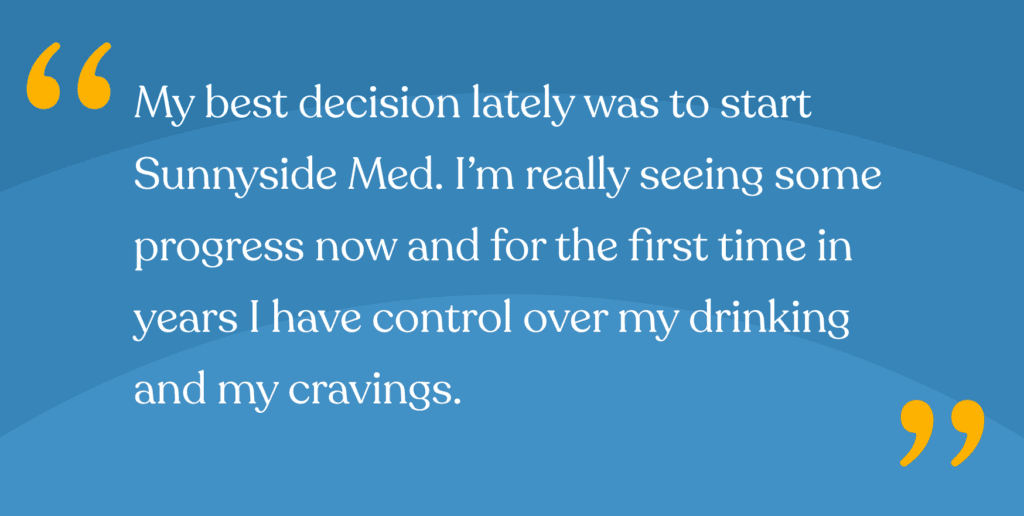
Naltrexone’s effect in dampening the brain’s reward response to alcohol creates an opening to short circuit the deeply ingrained habits that lead us to overconsume. We view this as a starting point, not the solution in and of itself.
Anchored by the proven behavior change system we’ve been refining over the last 5 years, Sunnyside Med takes a more comprehensive approach. We address the habit loop holistically, focusing on rewiring the cues, triggers and responses that lead us towards drinking in the first place.
So what exactly do you get with Sunnyside Med? In short, a personalized program that meets you where you are, and provides you with the tools you need to make alcohol a smaller part of your story.
Here’s a quick overview of our evidence-based approach:
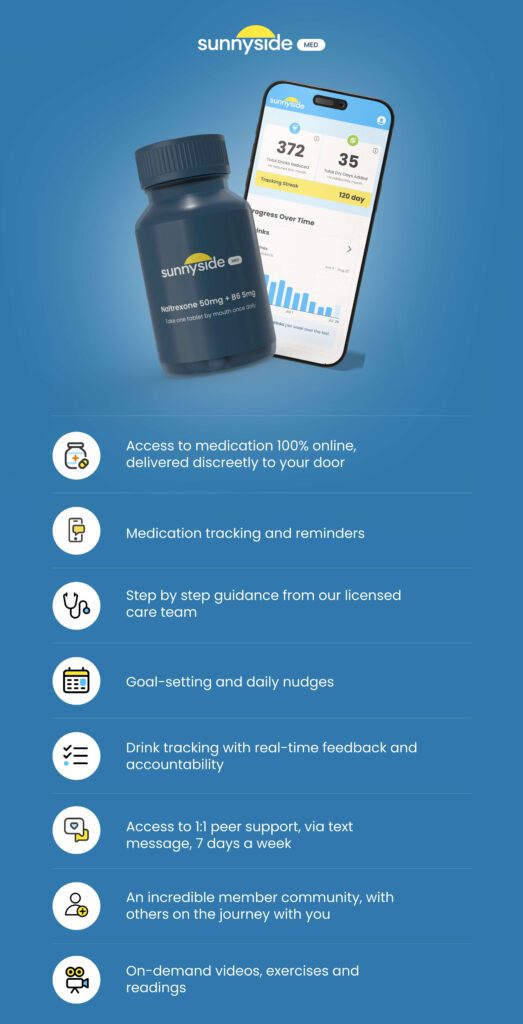
We’re already seeing that the combination of medication with Sunnyside’s behavior change program has the potential to deliver significant outcomes, with Sunnyside Med pilot members reporting significant reduction in drinking after receiving their medication.
Our early members are telling us that they’re achieving results they never thought possible.
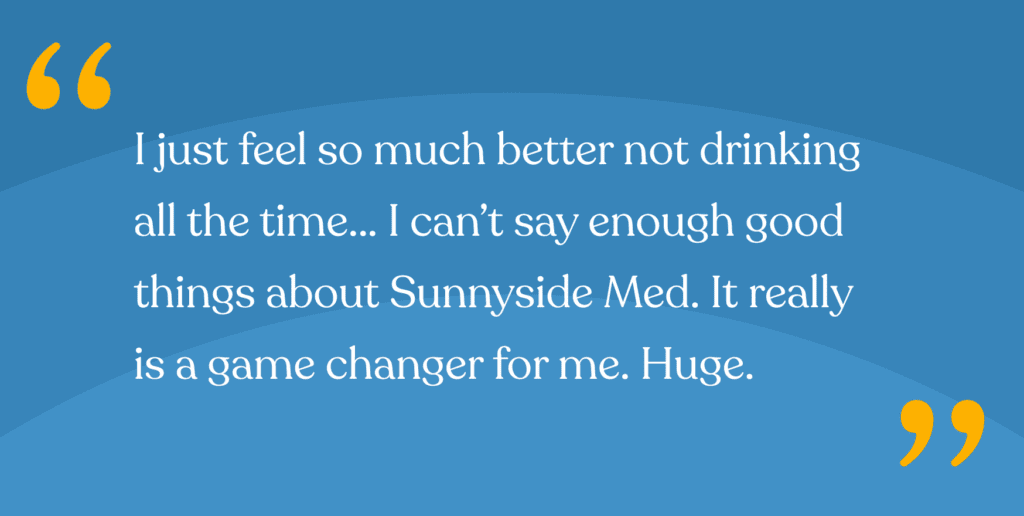
We’re confident in these early results, and have submitted an application for NIH funding to study our impact in a first-of-its-kind clinical trial bringing rigorous analysis methods to our in-world clinical program. We’ll share more results here as we continue collecting data.
Early results and member feedback reflect our position that a holistic, community centered approach can be more effective than medication alone.
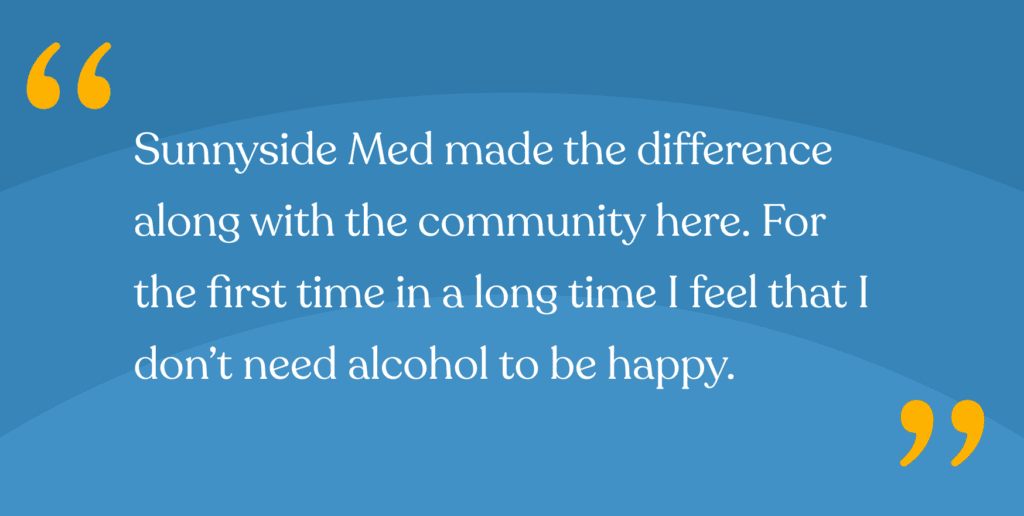
Creating a modern approach to alcohol health that embraces flexibility and balance
Sunnyside Med stays true to the proactive, individualized and goal-oriented approach we’ve taken with Sunnyside since day one.
We’ve developed an innovative protocol in partnership with leadership on our care team that makes medication available earlier on the alcohol journey, rather than as a last line of defense as has been typical until now. Our focus is on early detection and mitigation of at-risk drinking behavior, filling a huge gap in the spectrum of care for alcohol use.
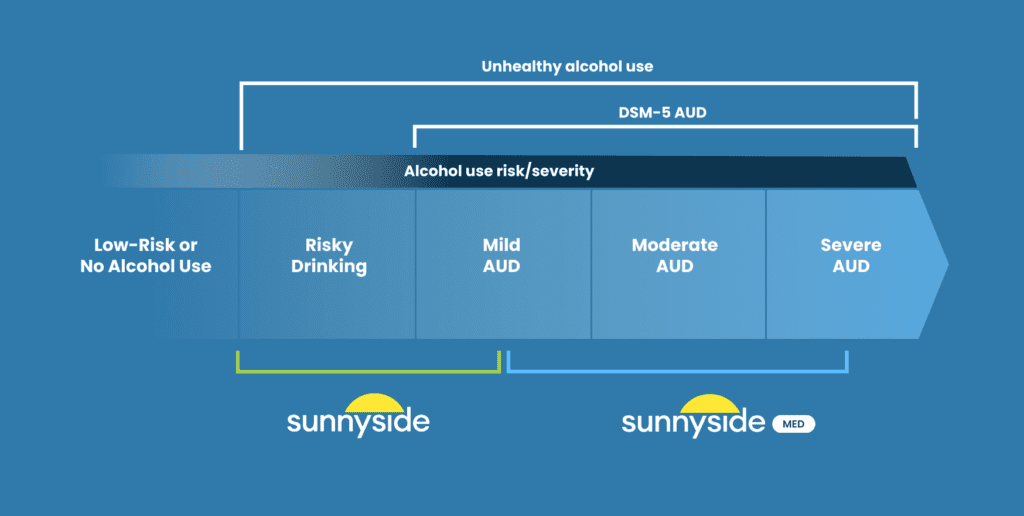
Preventive care is becoming the norm in virtually every major area of behavioral health, and where we can’t get it through the traditional health system consumers are taking health matters into their own hands. In metabolic health, providers don’t wait for a diabetes diagnosis before focusing on diet, exercise and lifestyle factors as early indicators present themselves. In the mental health space, there’s a movement towards proactive mindfulness rather than delaying until a serious crisis arises.
Yet alcohol treatment remains reactive and inaccessible, and clouded by stigma.
For most, treatment only kicks in as alcohol dependence becomes severe, often a decade or more after initial signs of at-risk drinking patterns begin1. The result is that many millions who could use support to change their drinking habits, those who have struggled to sustain changes on their own, don’t have access to the help they need until it’s too late.
The statistics are staggering. The NIAAA estimates that 28M U.S. adults, nearly 1 in 10, had past-year Alcohol Use Disorder in 20252. Of this population, fewer than 8% received any kind of treatment, and an even smaller fraction received medication for addressing their alcohol use (2.5%).
This means that 97.5% of those diagnosable with alcohol dependence, 27.3M U.S. adults, aren’t accessing proven, safe and effective care. Sunnyside Med is built for this vast majority – the individuals who want to change their relationship with alcohol, but who haven’t found a solution that aligns with their lifestyle and goals.
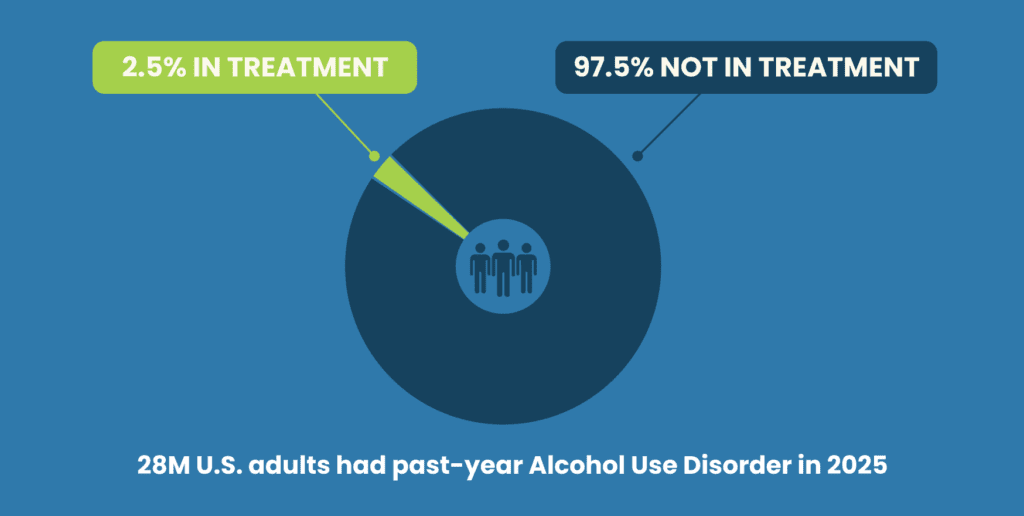
So why has alcohol treatment not kept up with the modern evolution of behavioral health? And why are existing options so dramatically underutilized? In developing Sunnyside Med we’ve targeted a few key factors that we believe to be slowing progress in this space.
| The Old Way | The Sunnyside Med Way |
| Reactive and crisis driven: We wait until alcohol dependence is severe before addressing it in the health system, leaving many to go it alone. | Proactive and preventive: Sunnyside Med focuses on early detection and intervention, providing care earlier to prevent the development of long-term dependence. |
| Medication used as a last resort: Despite being generally considered safe, naltrexone is rarely prescribed for mild and moderate cases of alcohol dependence. Instead, we wait until things get untenable before providing pharmaceutical intervention. | Medication prescribed early, in line with clinical guidelines: The Sunnyside Med protocol screens for at-risk behaviors, prescribing medication early with a lens towards preventing the development of more acute dependence. |
| Somber and clinical: With treatment options catered only to the highest severity cases, alcohol dependence is positioned in the most extreme clinical terms, alienating those with lower acuity needs. | Warm, welcoming and accessible: Consistent with the brand we’ve been building since day one, Sunnyside Med creates an approachable starting point for anyone questioning their relationship with alcohol, without sacrificing clinical rigor. |
| Stigmatized, shame-based and difficult to talk about: Our entire vocabulary around alcohol dependence carries the weight of shame and moral failure. | 100% online, private and discreet: Alcohol support is a perfect telehealth use case, with an asynchronous model that completely avoids judgment and scrutiny. |
| Gatekeeping due to treatment gap in primary care: Alcohol screens in the primary care setting are notoriously flakey, and when a doctor asks about alcohol consumption face to face the tendency of the patient is to underreport. The miss rate on alcohol dependence diagnosis is incredibly high, preventing entry into care for the vast majority of those who need it. | Direct to consumer reduces barriers to entry: Sunnyside Med’s direct to consumer model gives members a path to accessing care on their own terms, when they’re ready. We do the screening and develop a personalized treatment plan based on individual starting point, focus areas and goals, eliminating structural barriers to accessing care. |
| One-size-fits-all approach: We’re stuck in an outdated model that suggests complete abstinence is the only path to recovery from alcohol dependence. A sobriety only approach doesn’t appeal to the vast majority of drinkers, and is medically necessary in many cases. This rigid model closes the door on those not open to complete sobriety. | Adapted to individual lifestyle and goals: Recognizing there are just as many paths as there are people on them, Sunnyside Med embraces a model of care that respects the goals and lifestyle of our members rather than forcing a one size fits all agenda. Sunnyside Med is for drinking less or quitting, and we’re just as happy with either outcome. |
| Extremely high cost late stage interventions: Treating severe alcohol dependence with in-patient interventions is costly and inaccessible, with high rates of recidivism as well. | Affordable entry point for earlier intervention: Getting started early with a prevention focused approach can be exponentially more cost effective, for both the end member and the health system. |
| Typically isolating and lonely: Those with alcohol dependence issues too often go it alone, isolating themselves from the people in their lives who could help. | Human connection at the core: Sunnyside revolves around community and human connection, providing a reminder that members are never alone on this journey. |
Mike and I unpacked how Sunnyside Med is different during our recent podcast conversation. Tap here to listen to this segment:
With Sunnyside Med, we’re bringing alcohol health into the modern era with a flexible, personalized, and preventive approach. We’re building the front door for anyone looking to change their relationship with alcohol, on their terms.
Why now is the time to fundamentally change the way we address alcohol as a component of our health

As awareness grows about alcohol’s undeniable impact on both short- and long-term health outcomes, we’re on the cusp of the largest shift in consumer behavior around alcohol of our lifetimes.
A widely shared August 2025 Gallup poll revealed a historical low in drinking rates, with 46% of those surveyed reporting no alcohol consumption, up dramatically from just 33% in 2022.
When you pay attention to the latest research around alcohol and health, it’s no wonder drinking patterns are changing. We now understand that even moderate amounts of alcohol can be linked to serious health consequences. Dr. Brooke Scheller, friend of the Sunnyside Podcast, summarizes the latest findings from the Department of Health and Human Services in a recent post:
- 1 drink per day increases the risk of liver disease, cirrhosis, and esophageal and oral cancers6
- Any use of alcohol increases the risk of 7 different types of cancer (with women at greater risk from even smaller amounts of alcohol)7
- Higher alcohol intake is associated with higher mortality8
- Alcohol is causally linked with more than 200 health conditions, including infectious diseases, heart disease, cancer, digestive diseases, mental health disorders, metabolic diseases, and injuries.9
- While evidence shows that 1 drink per day shows a decrease in ischemic stroke risk, 2 drinks per day significantly increased the risk for ischemic stroke.10
These connections have broken through into the mainstream health dialog, with broad coverage across major publications. For some, increasing exposure to this type of information is enough to change habits around alcohol, or even turn the “alcohol switch” off entirely. This likely at least somewhat explains the drop in alcohol consumption reported in the Gallup poll.
But for many others, habits around alcohol are so deeply ingrained that even with this knowledge, even with the best intentions and a commitment to health, drinking habits persist unchanged.
At Sunnyside, we’re championing the population who sees the data yet still struggles to make a change. We spend every day in the shoes of those who know that alcohol isn’t serving them, who are motivated to find balance, yet who have struggled to achieve it on their own.
For those facing challenges with alcohol, it can be lonely and isolating to see stories suggesting we’re “post alcohol” or that Americans have moved on from drinking. Without a place to turn for nonjudgmental support, the cycle of shame is further reinforced.
Sunnyside exists to meet this moment. We provide evidence-based solutions wrapped in an inviting brand platform centered on optimism and positivity. We celebrate the path to healthier drinking, no matter your starting point, creating a welcoming entry point for those who need more help to turn newfound knowledge about alcohol’s impact on health into actionable, long-term change.
With this next chapter, a continuation of our life’s work
For Ian and me, broadening access to proactive alcohol health support isn’t just a job. It’s our life’s work.
Our parents lacked the tools to get started on the path to a healthier relationship with alcohol until they were deep in the throes of problematic dependence. We’ve felt what it’s like to live in households where alcohol dominated the day to day. We show up every day determined to help millions of individuals and families avoid the same experience.
The way we’ve done things until now won’t get us there. The future of alcohol health looks very different than it does today.
Sunnyside is building towards a future where managing alcohol consumption is as common as managing diet and exercise as components of our proactive health toolkits.
A future where we get started with healthy drinking habits early, avoiding the negative long-term consequences of alcohol overuse.
Where we embrace balance, and don’t get stuck in all or nothing thinking.
Where there are as many paths to healthier drinking habits as there are people on them.
We get there with best-in-class technology, anchored by a companion app experience that fills the gaps between medication dosages, and between doctor visits. With experiences that anticipate your needs, engage at the right level based on that need, and that delight with empathy every step of the way.
Changing drinking habits is hard, but the small steps towards big changes don’t need to be.
We’re building the front door for anyone looking to change their relationship with alcohol, no matter their starting point or end goal. Sunnyside Med provides a new pathway that expands the tools available.
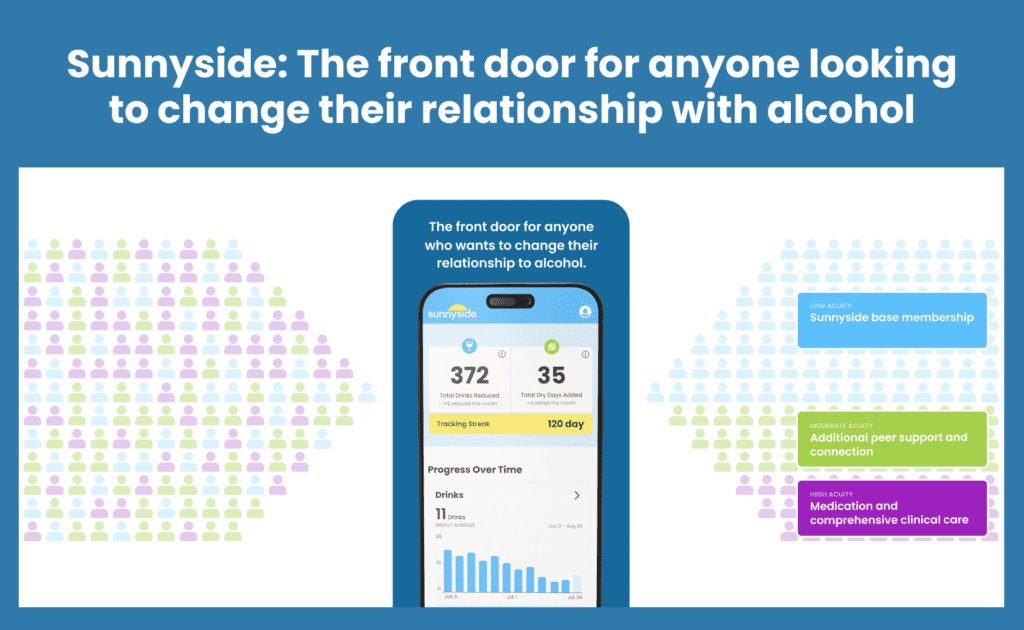
Today, millions of people are blocked from achieving their lifestyle and health goals because drinking habits get in the way. We’re here to make alcohol a smaller part of each of their stories.
And we won’t stop until the millions left behind by the current system have a clearer path forward.
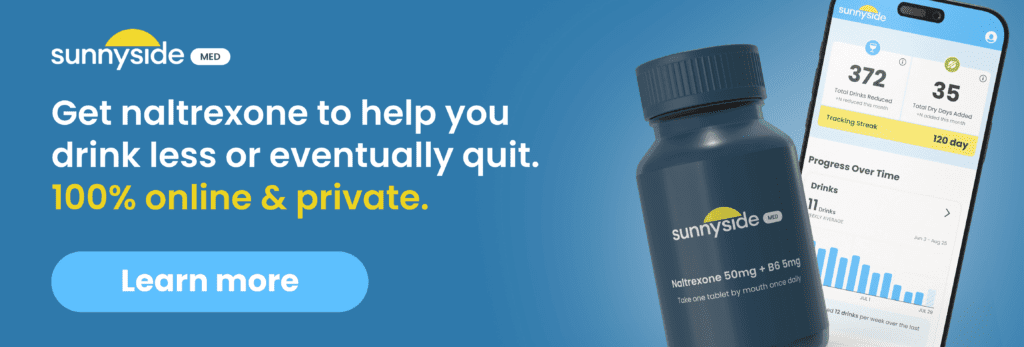
Safety
Sunnyside Med provides access to a compounded medication (naltrexone 50mg B6 5mg), and is available only if prescribed by a licensed provider through our tele-health program. Sunnyside partners with a pharmacy that specializes in customizing compounded medications to meet unique patient needs. Compounded drugs are not FDA-approved, which means they have not undergone FDA premarket review for safety, effectiveness, and quality.
Common side effects of naltrexone, the active ingredient in our compounded medication, may include: nausea, sleepiness, headache, dizziness, vomiting, decreased appetite, muscle cramps, joint pain, and trouble sleeping.
More serious risks can include liver injury or allergic reactions. Stop taking naltrexone and contact your provider if you experience symptoms like severe abdominal pain, dark urine, yellowing of the skin or eyes (jaundice), or a rash with fever. You should not take naltrexone if you use opioids—including prescription medications or street drugs—as it may cause sudden opioid withdrawal.
These are not all the possible side effects. Tell your healthcare provider if you experience any side effects that bother you or don’t go away. Only take this medication as prescribed.
Sources
- National Institute on Alcohol Abuse and Alcoholism. Alcohol Survey Reveals ‘Lost Decade’ Between Ages of Disorder Onset and Treatment. NIAAA News Releases.
- National Institute on Alcohol Abuse and Alcoholism. Alcohol Treatment in the United States. Alcohol Facts & Statistics.
- McPheeters M, O’Connor E, Riley S, et al. Pharmacotherapy for Alcohol Use Disorder: A Systematic Review and Meta-Analysis. JAMA.
- SAMHSA. Efficacy of Naltrexone in the Treatment of Alcohol Dependence. SAMHSA Medication-Assisted Treatment.
- Srisurapanont M, Jarusuraisin N. Naltrexone for the Treatment of Alcoholism: A Meta-Analysis of Randomized Controlled Trials. International Journal of Neuropsychopharmacology.
- Srisurapanont M, Jarusuraisin N. Naltrexone for the Treatment of Alcoholism: A Meta-Analysis of Randomized Controlled Trials. International Journal of Neuropsychopharmacology.
- U.S. Department of Health and Human Services. Surgeon General’s Advisory: Alcohol and Cancer Risk. HHS.
- Association Between Daily Alcohol Intake and Risk of All-Cause Mortality: A Systematic Review and Meta-analyses. JAMA Network Open.
- Alcohol Consumption: Medical Implications, the Liver and Beyond (Alcohol and Alcoholism, Oxford).
- Alcohol Consumption: Medical Implications, the Liver and Beyond (Alcohol and Alcoholism, Oxford).
